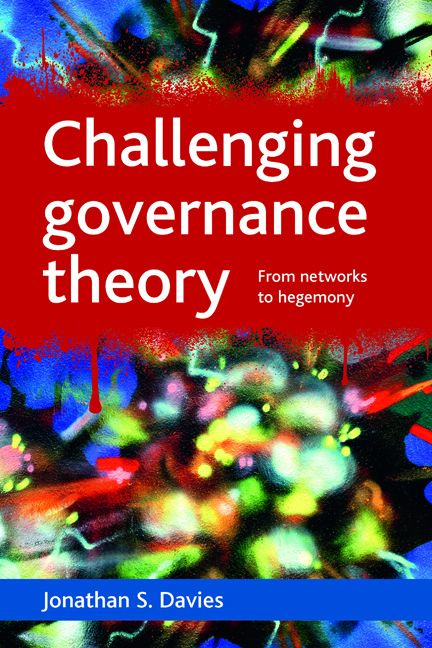Book contents
- Frontmatter
- Dedication
- Contents
- List of tables
- Preface
- Introduction
- one The network governance milieu
- two Network governance policy
- three The limits of network governance
- four Beyond the transformation thesis
- five From network governance to hegemony
- six Gramscian governance research
- seven Conclusion
- References
five - From network governance to hegemony
Published online by Cambridge University Press: 07 September 2022
- Frontmatter
- Dedication
- Contents
- List of tables
- Preface
- Introduction
- one The network governance milieu
- two Network governance policy
- three The limits of network governance
- four Beyond the transformation thesis
- five From network governance to hegemony
- six Gramscian governance research
- seven Conclusion
- References
Summary
Introduction
To recap, Chapter Three argued that actual-existing governance networks appear dysfunctional from the standpoint of post-traditional governance theory, tending to replicate practices they were meant to surpass. Chapter Four argued that the basis for explaining this puzzle is that the social, political and economic conditions for widespread and sustainable network governance do not exist. If so, the phenomenon of governance networks must be explained in terms other than those of network governance theory. Chapter Five develops a Gramscian account, grounded in Marxist political economy. It argues that the promotion of governance networks can fruitfully be understood as a dimension of neoliberal hegemonic strategy, part of the ‘regulative, cultural work of producing ideal neo-liberal subjects’ (Johnson, 2007, p 107). However, as the critique of Foucauldian governance theory in Chapter Three and the discussion of the relationship between states and capitals in Chapter Four suggested, hegemony exists in a dialectical relationship with domination, formulated in Gramsci's theory of the integral state. The chapter argues that the everyday politics of governance networks represent the dialectics of the integral state in microcosm. These dialectics explain why roll-forward governmentalisation seems to trump the connectionist project and, hence, why the neoliberal hegemonic strategy confronts structural limits in everyday political encounters.
This chapter begins with a brief discussion of the post-Marxist Gramscian tradition before exploring the orthodox Gramscian conception of hegemony, focusing on the historic bloc, the integral state and passive revolution. Adapting Boltanski and Chiapello (2005a, 2005b), it then develops a historical account of how the synthesis of ‘free market’ economics and network ideology occurred in the fashioning of neoliberalism. The chapter proceeds to develop a preliminary assessment of the efficacy of the ideology of networks. It argues that viewed through the prism of the integral state, the everyday politics of governance networks point to the incompatibility of connectionism and neoliberal political economy. It finally contextualises the connectionist hegemonic project with the broader repertoire of governing technologies that constitute any concrete social formation.
Post-traditional Gramscian analysis
Chapter One argued that Gramscian influence in governance and public policy declined as post-traditional theory gained ground. Post-Gramscians (Lash, 2007; Thoburn, 2007) go so far as to announce the era of ‘post-hegemonic’ power, defined as the dispersion of collective traditions and the general meltdown of institutions, making the organisation of hegemony impossible.
Information
- Type
- Chapter
- Information
- Challenging Governance TheoryFrom Networks to Hegemony, pp. 101 - 124Publisher: Bristol University PressPrint publication year: 2011
